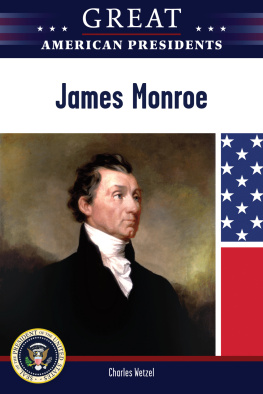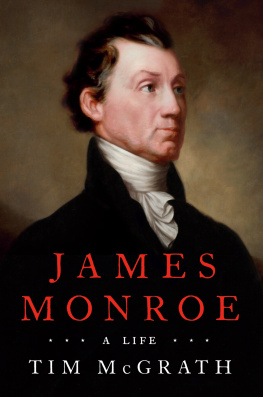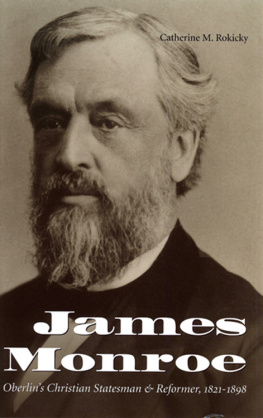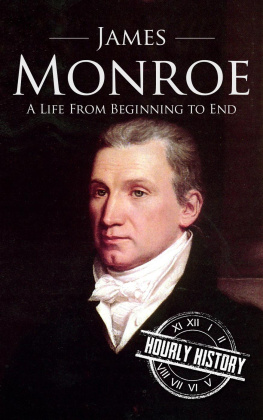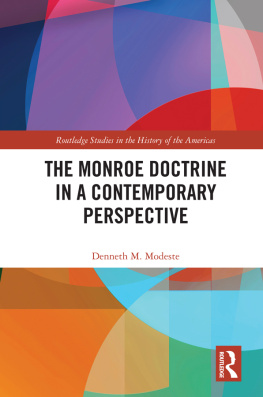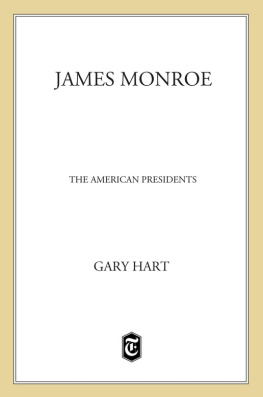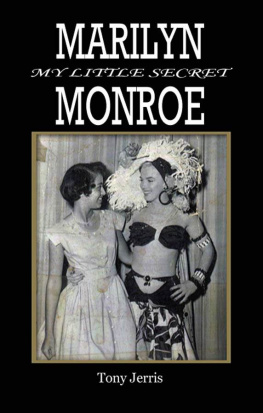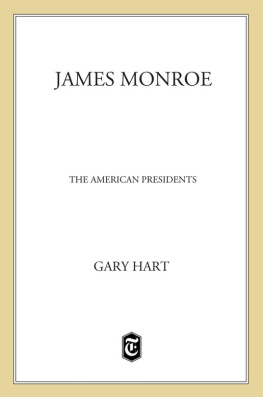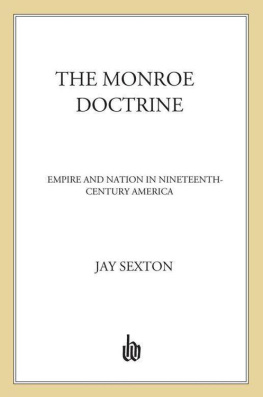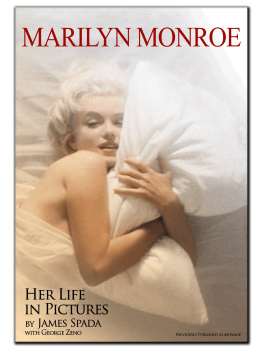Charles Wetzel - James Monroe
Here you can read online Charles Wetzel - James Monroe full text of the book (entire story) in english for free. Download pdf and epub, get meaning, cover and reviews about this ebook. year: 2016, publisher: Infobase Publishing, genre: Politics. Description of the work, (preface) as well as reviews are available. Best literature library LitArk.com created for fans of good reading and offers a wide selection of genres:
Romance novel
Science fiction
Adventure
Detective
Science
History
Home and family
Prose
Art
Politics
Computer
Non-fiction
Religion
Business
Children
Humor
Choose a favorite category and find really read worthwhile books. Enjoy immersion in the world of imagination, feel the emotions of the characters or learn something new for yourself, make an fascinating discovery.
- Book:James Monroe
- Author:
- Publisher:Infobase Publishing
- Genre:
- Year:2016
- Rating:5 / 5
- Favourites:Add to favourites
- Your mark:
- 100
- 1
- 2
- 3
- 4
- 5
James Monroe: summary, description and annotation
We offer to read an annotation, description, summary or preface (depends on what the author of the book "James Monroe" wrote himself). If you haven't found the necessary information about the book — write in the comments, we will try to find it.
After an adventurous career as a soldier in the Revolutionary War, James Monroe went on to become a two-term president of the nation he helped create. Among his achievements was the establishment of the Monroe Doctrine, declaring that the United States
James Monroe — read online for free the complete book (whole text) full work
Below is the text of the book, divided by pages. System saving the place of the last page read, allows you to conveniently read the book "James Monroe" online for free, without having to search again every time where you left off. Put a bookmark, and you can go to the page where you finished reading at any time.
Font size:
Interval:
Bookmark:
Copyright 2016 by Infobase
All rights reserved. No part of this publication may be reproduced or utilized in any form or by any means, electronic or mechanical, including photocopying, recording, or by any information storage or retrieval systems, without permission in writing from the publisher. For more information, contact:
Chelsea House
An imprint of Infobase
132 West 31st Street
New York NY 10001
ISBN 978-1-4381-4486-3
You can find Chelsea House on the World Wide Web
at http://www.infobaselearning.com
The 6-foot-tall, rawboned 18-year-old lieutenant from Virginia, who had quit college to fight in America's War of Independence, struggled forward through deep drifts of snow. The small company of advance guard that James Monroe had volunteered to join had come ashore in New Jersey from the ice-choked Delaware River, its waters flecked with the late glimmerings of winter dusk. On the Pennsylvania shore General George Washington and the tattered remnant of his Continental Army, having retreated through New Jersey only a few weeks earlier, waited to cross at a later moment. Captain William Washington, Monroe's senior officer and a relative of the general's, had as his mission that Christmas night in 1776 to prevent any communication between Trenton and the British to the north so that Colonel Johann Gottlieb Rail's Hessian soldiers would be isolated in their Trenton outpost and at the mercy of a surprise attack.
A mile and a half inland Captain Washington's men reached their objective, an intersection of the Trenton-Princeton pike. A northeast wind howled over the drifts, hurling sleety snow through the air, making conversation virtually impossible. The soldiers set up their roadblock and, as hours passed, took a number of prisoners who might otherwise have spread word that American troops had returned to New Jersey. Such information would surely have alarmed General William Howe, commander of His Majesty George III's British forces in North America. Confident that the Americans would not attack in such bad winter weather, Howe had dispersed his men in several New Jersey towns and was certain that he had already crushed the American "rebellion."
Towards dawn, General Washington and his men followed Captain Washington's route. When the general's force arrived, Monroe and his comrades fell in with the larger army as it curved south towards Trenton. They soon exchanged shots with Hessian pickets, and on December 26 the Battle of Trenton began.
In the developing conflict, 26-year-old Colonel Henry Knox, a rotund Boston ex-bookseller in charge of General Washington's cannon, brought his artillery to bear, raking the streets of the town with shot that scattered Rail's still half-drowsing troops as they fell out of their barracks. Assisting Knox was another young college dropout Monroe's age, Alexander Hamilton, a recent immigrant from the West Indies.
Rail's artillerymen tried desperately to get their own guns into action, galloping the horse-drawn caissons toward the front lines, but Knox's withering fire discouraged them, and one by one they abandoned their efforts. To prevent the Hessians mounting their cannon, Captain Washington and Monroe led a charge to seize the enemy guns. The Hessians focused their aim on the exposed Americans, and William Washington fell, his hands pierced by musket shot. Monroe continued to lead the charge, but within moments an enemy ball struck him as well, tearing through his shoulder to sever an artery. Both men were quickly carried off the battlefield.
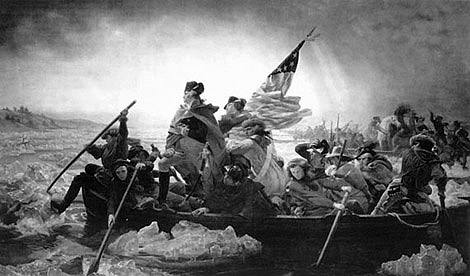
On December 25, 1776, General George Washington led a suprise attack at Trenton, New Jersey. Washington and his troops crossed the Delaware River during the night and attacked at dawn. The American army defeated the British forces while suffering few losses.
Source: National Archives and Records Administration. Special Media Archives Services Division.
Without immediate attention, Monroe would have bled to death on the spot, but a surgeon who, providentially, had voluntarily attached himself to Captain Washington's outfit before the battle hastened to stem the flow of blood. The doctors aiding the American army that day could not know that they served the future first president of the United States and key members of his administration. As for the young Virginia lieutenant whose life was saved, they had no reason to imagine that after serving the fledgling republic in many important positions, he would become the fifth president of the United States and promulgate one of the most famous foreign policy declarations in American historythe Monroe Doctrine.
James Monroe was born on April 28, 1758, in Westmoreland County, Virginia, the county that had been birthplace to two men who would precede him as president, George Washington and James Madison. The largest and oldest of the colonies that would form the original United States, Virginia held great prominence, dictated by its size and history and by the political and intellectual brilliance of many of its foremost citizens. Like leaders in other parts of America, distinguished Virginians turned to men of their own class when they thought in terms of friendships and political offices. Fortunately for James Monroe's future, his father, Spence Monroe, though not one of the Old Dominion's wealthiest citizens, had property sufficient to qualify him as a respectable landed gentleman. Monroe's mother, Elizabeth Jones, the daughter of a Welsh immigrant, inherited additional property in King George County, which helped increase the Monroe family's standing.
The Monroe lineage was a worthy one by Virginia standards. According to family legend, Andrew Monroe, a Scottish highlander, had been an officer in King Charles I's army in 1648, when it fought Oliver Cromwell's Puritan forces in the Battle of Preston. With Charles's subsequent defeat and execution, Andrew Monroe had emigrated to the Chesapeake Bay region and settled in Virginia. As descendants of this founder of one of the "Cavalier" familiesthe distinguished royalist refugees from Charles I's servicethe Monroes enjoyed a special status in Virginia society.
James Monroe's credentials further improved because his wealthy uncle on his mother's side, Judge Joseph Jones, sat firmly with the colony's ruling elite. Trained in the law in England, a noted member of the Virginia House of Burgesses (the colony's legislative assembly), a man who would distinguish himself in the revolutionary cause, represent Virginia in the Continental Congress, and end his life as a state supreme court justice, Jones would earn much more space in the autobiography James Monroe wrote late in life than would James's own father. When Spence Monroe died in 1774, Judge Jones arranged for James to be enrolled at William and Mary College, the first of the Monroes to be afforded that opportunity. James, who had begun his formal education at age 11 at the best local school available to him, entered the college with such a mastery of Latin and mathematics that he was placed in the upper division.
Having grown up in the rural tidewater with a love for the land, for farming, and for such country pleasures as riding and hunting (which remained with him throughout his life), James Monroe found Williamsburg, Virginia's capital and site of the college, delightful and stimulating. In the summer of 1774, however, the political atmosphere was perhaps a bit too stimulating for Monroe to concentrate on his studies.
The House of Burgesses had its activities suspended by Virginia's royal governor, Lord Dunmore, because of its radical sympathies with rebellious colonists. So, it met illegally in the Raleigh Tavern to continue "governing." When Dunmore impounded the town's gunpowder to deprive the radicals of potential arms, his act incited Patrick Henry, a rebel whose oratory would fire the country, to march on Williamsburg with a following of irate colonists to persuade Dunmore to change his mind.
Font size:
Interval:
Bookmark:
Similar books «James Monroe»
Look at similar books to James Monroe. We have selected literature similar in name and meaning in the hope of providing readers with more options to find new, interesting, not yet read works.
Discussion, reviews of the book James Monroe and just readers' own opinions. Leave your comments, write what you think about the work, its meaning or the main characters. Specify what exactly you liked and what you didn't like, and why you think so.

